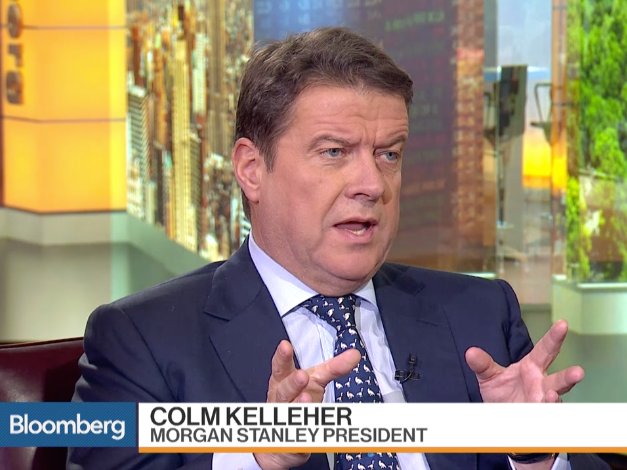 Colm Kelleher.Screenshot/Bloomberg TV
Colm Kelleher.Screenshot/Bloomberg TVMorgan Stanley may not have quite as strong a fourth-quarter as other Wall Street banks have been predicting for themselves.
The firm has made a big bet on equities trading — historically its strongest trading business — and cut back on its fixed income, currencies, and commodities, or FICC, business in the past year.
Now, as fixed income starts to rebound and the equities revenue pool shrinks, that could mean bad news for the firm.
President Colm Kelleher was cautious about his predictions for the quarter in an interview with Bloomberg TV’s Erik Schatzker Tuesday.
“Things are going fine,” Kelleher said after being asked about Morgan Stanley’s fourth-quarter performance in light of recent positive comments made by other bank executives.
“I think there’s a bit of over-exuberance about how well people are doing.”
He said that while flows have picked up, the overall fee pool for equities and FICC trading are up only marginally on the year.
Kelleher said that while Morgan Stanley is getting an increased share of the fees, “particularly in FICC,” there has not been a significant pickup in activity versus last quarter.
JPMorgan CEO Jamie Dimon and Bank of America Merrill Lynch CEO Brian Moynihan last week both indicated that their firms’ trading businesses were performing strongly for the quarter. Dimon said the markets division at JPMorgan was up about 15% year-over-year, while Moynihan said his bank’s FICC division was up 15% quarter-to-date versus last year.
“I think business is improving,” Kelleher said. “I think the degree to which it’s improving has been slightly overstated. I certainly think the equity markets are not anything near that percentage.”
Equities is Morgan Stanley’s dominant trading business. The firm resized its fixed income business last year, laying off 25% of that staff last December. But equities revenues across Wall Street are forecast to be down 15% year-over-year for the full-year, according to the data analytics company Coalition.
The CEO of JPMorgan’s investment bank, Daniel Pinto, also hinted at the tough trading conditions in equities in a recent interview with Business Insider’s Matt Turner. He said:
“We will see how it plays out when equities goes into a down cycle. Everyone said, ‘We’ll cut fixed income and focus all of our energy on protecting our equities franchise.’ Fine. Equities was growing. Now we have the first year where the equities wallet shrinks, and we may have another one.”
JPMorgan and Goldman Sachs are the only major banks to have explicitly continued investing in FICC despite that business’ downturn in recent years. FICC started to bounce back in the second- and third-quarters, to the benefit of those two firms.
Kelleher, for his part, said that while he is positive about 2017 and 2018, and believes we’ve already seen the bottom in FICC revenues, much of the positive fourth-quarter talk can be chalked up to “election euphoria.”
“I don’t think you can extrapolate the quarter from that,” he said.
NOW WATCH: Bernie Madoff explains in rare interview from prison how he rationalized his crimes













